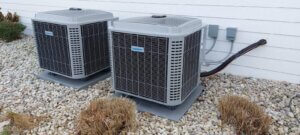Why a Furnace Tune-Up Matters
Enhanced Efficiency and Lower Energy Bills: Over time, furnaces can lose efficiency, especially if they’re not maintained regularly. A tune-up includes cleaning and adjusting components to ensure your furnace runs as efficiently as possible. This not only conserves energy but can also lead to lower heating bills – a welcome relief in the colder months when energy use typically spikes.
Preventing Breakdowns: The last thing anyone wants is their furnace breaking down in the middle of a cold snap. Many issues that lead to breakdowns can be caught early during a tune-up. From worn-out parts to potential electrical issues, a professional technician can identify and resolve small problems before they escalate into major, costly repairs.
Extending the Life of Your Furnace: Regular maintenance, including annual tune-ups, can significantly extend the lifespan of your furnace. By keeping it in good working order, you delay the need for a costly replacement, getting the most out of your current system.
Ensuring Safety: Furnaces, especially gas ones, can pose safety risks if not properly maintained. A tune-up involves checking for gas leaks, examining the heat exchanger for cracks, and ensuring the exhaust system is properly venting outdoors. These checks are crucial for preventing dangerous situations like carbon monoxide leaks.
Maintaining Warranty: Many furnace manufacturers require regular maintenance as a condition of their warranty. Skipping a tune-up can void your warranty, leaving you uncovered in case of major system failures.
What Does a Furnace Tune-Up Include?
- Inspecting and cleaning the blower motor, heat exchanger, and burners.
- Checking and recalibrating the thermostat as needed.
- Examining electrical connections and testing system controls.
- Replacing or cleaning air filters, which improve air quality and efficiency.
- Inspecting the vent system and air intake grilles, removing any blockages.




